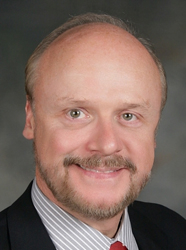Integrating UMDNJ and Rutgers: The Opportunities and Challenges Ahead and What It Means for New Jersey Residents
A conversation with Chris Molloy, interm provost for biomedical and health sciences at Rutgers

This summer – a year after Gov. Chris Christie signed sweeping higher education reform legislation – a new Rutgers University will be born with the integration of most of the schools and institutes that make up the University of Medicine and Dentistry of New Jersey. Christopher J. Molloy, Rutgers’ interim provost for biomedical and health sciences is leading the day-to-day activities surrounding integration. It is an undertaking he admits has led to some fatigue and sleepless nights.
But Molloy, a molecular and cellular pharmacologist who has served as dean of the Rutgers Ernest Mario School of Pharmacy, worked in research, management and drug discovery – and received his undergraduate degree from the Rutgers College of Pharmacy and his Ph.D. from the Rutgers/UMDNJ Joint Graduate Program in Toxicology – says the birth of the new, more comprehensive Rutgers University will bring a higher level of prestige to the state, attract more revenue through grants and partnerships, and provide students greater academic opportunities.
Rutgers Today sat down with Molloy to talk about what has occurred since the New Jersey Medical and Health Sciences Education Restructuring Act was signed into law by Gov. Chris Christie in August and to learn more about what integration means to the Rutgers community and New Jersey residents.
Rutgers Today: Tell us about the logistics of integrating Rutgers and UMDNJ, giving us a snapshot of what has occurred since the Health Sciences Education Restructuring Act was signed and what we can expect on July 1, 2013?
Molloy: It has really been important to bring together teams from both Rutgers and UMDNJ that can work together so we can identify key issues and changes that need to be implemented from day one. We have to make sure, for instance, that all accreditations remain intact, that there are no disruptions to any student’s education and no interruption to any patient medical care. We have 13 teams involved in everything from finance and information technology to human resources and academic and clinical programs. We are focusing on finding answers to questions ranging from what computer program we are going to use to manage our intellectual properties and patents to developing new inter professional education programs in the health sciences. Certain aspects of the integration will take multiple years to complete due to the complexity. This is why we want to make certain to maximize our efforts and not leave loose ends.
Rutgers Today: What are the challenges of integrating two higher education systems with different populations and missions and what does it entail in order to be successful?
Molloy: Rutgers is a strong, basic research, primarily undergraduate tuition-based university, highly regarded with an outstanding brand. But it is limited by the fact that it has no access to medical graduate education. Although Rutgers does well in translating basic science, it cannot advance that scientific knowledge into advances in clinical medicine which is so important to this country. UMDNJ is a broad public medical sciences university with strong clinical research capabilities that must depend on clinical revenues that are becoming more variable as healthcare evolves. The new Rutgers – including the creation of Rutgers Biomedical and Health Sciences – will have “bench to bedside” capabilities, new revenue streams, and a bigger impact on health care and research in New Jersey and throughout the country that neither of the universities could have done alone.
Rutgers Today: What will the Rutgers-UMDNJ integration mean to New Jersey residents – those who have a connection and those who have never stepped foot on any of the campuses?
Molloy: New Jersey will finally have a comprehensive state university that spans undergraduate and graduate education in a wide range of areas that will help to elevate the Rutgers name throughout the country. The state university will now have a brand that spans from Division I football to the highest level of biomedical and scientific research. This will allow Rutgers to compete with high-ranking state universities like Michigan, Virginia, Wisconsin and North Carolina and help New Jersey retain and grow the biotech and pharmaceutical industry that has been a major economic engine in New Jersey. Over time, the new Rutgers will have more financial stability than what existed for each of the universities individually because it will be funded not only through tuition but also by generating increased clinical and research revenues.
Rutgers Today: How will this improve the quality of life of people in New Jersey?
Molloy: For those who live in New Jersey, the integration will mean that scientific and biomedical research in the state will be greatly expanded. What this means is that biotech businesses and jobs already located in New Jersey will have more of a reason to stay and those looking to relocate from other areas of the country will have more of a reason to do so because of the expansion in research capabilities. This will result in Rutgers having more leverage to seek out public-private partnerships that will enable New Jersey to grow a stronger economy and create jobs which will be good for everyone. Most importantly, the new Rutgers University will be able to offer New Jersey students a more comprehensive undergraduate and graduate education because they will now have access to programs that have not been available. New Jersey citizens will benefit from enhanced, coordinated medical care from our allied medical, dental, nursing, pharmacy and related professional schools and their affiliated hospital partners statewide. The mission of Rutgers is to be a public institution that supports research and scholarship, teaching and service to the citizens of New Jersey. By adding the biomedical health sciences component we will strengthen this mission for all New Jersey residents.
Media Contact: Robin Lally
732-932-7084, ext. 652